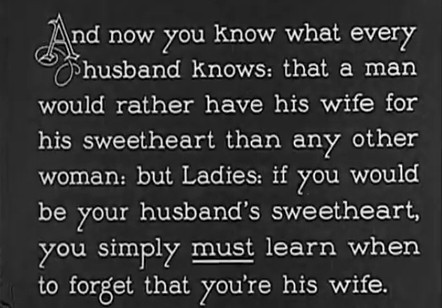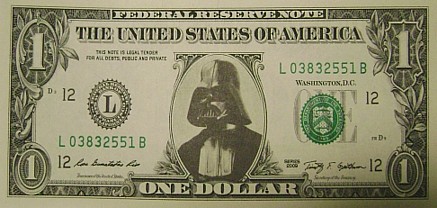
Previous William Thomas Sherman Info Page postings, quotes, observations, etc.

Largely grotesque and tasteless even by later standards, here are DeMille morals circa 1920.
http://www.youtube.com/watch?v=jz2QHynswYA
["Why Change Your Wife? part 1 - Gloria Swanson - Bebe Daniels"]
Leaving comedy films aside, a good film maker (good in the sense of better than just run of the mill) ought to be something of a good poet. And a poet to be good must be of and have a strong affinity for the truth. In looking over material related to Gloria Swanson, Cecil B. DeMille and Billy Wilder came up; neither of whom strike me as film makers of much or actual substance. Wilder seems like a ham, but who though a proficient and artful photographic technician didn't really know how to be funny and even less had anything of special significance to say. "Sunset Boulevard" is, aside from lighting and shot composition, interesting solely for Swanson's performance; which in many parts is actually quite funny. The rest of it is a hokey story that is, unlike "Whatever Happened to Baby Jane" (with which it should be compared), completely unbelievable; not least of which in that Norma Desmond as played by Swanson is actually far more romantically attractive than her younger female counterpart/love interest in the film. DeMille, I will have to admit, is much more of an enigma and harder to fathom than Wilder. I can't help but wonder if the secret to him wasn't that he was an arrant hypocrite; yet I would forbear asserting or assuming so much unless I came to learn more deeply about him. This admitted, he seems like a moralistic P.T. Barnum. But does such a character make any sense except as a hypocrite? Again, it is hard for me at the moment to say. People sometimes err when they mean well, but they do nonetheless and despite their erring mean well.

"He trusted in the Lord, let the Lord save him."
It is of course unnecessary to remark that it is not Disney that is to blame for this state of things, and it goes without saying that Walt Disney himself were he alive today would be appalled. The Disney corporation, like Microsoft and other major business, has fallen into the hands of the same racketeers that effectually dominate and control most of the mass media; including films, television, the computer industry, and, as you can see, the post office. And what is called Disney-Pixar is the same nefarious conglomerate as Dreamworks, Star Wars, Harry Potter; all of who receive their highest mandates and instructions from, as I for a moment cannot doubt, criminal spirit people.
But then who can vie with or will contend against criminal spirit people?

["MAIL A SMILE Stamps (Disney/Pixar)"]
Now here, by stark contrast, is somebody people actually do (and still do) love. (While for "Tales of Frankenstein," see here.)
["Gloria Swanson in Paris (1981)"]
With the love and devotion of millions upon millions of shallow, fickle, and insincere people, what now more could you want?
Now, there you go you see, something I myself would never have thought of -- a designer airline.
Excerpts from Augustine's epistles continued.
[ch. 2] 3. It becomes you, therefore, out of love to this true life, to account yourself “desolate” in this world, however great the prosperity of your lot may be. For as that is the true life, in comparison with which the present life, which is much loved, is not worthy to be called life, however happy and prolonged it be, so is it also the true consolation promised by the Lord in the words of Isaiah, “I will give him the true consolation, peace upon peace,” without which consolation men find themselves, in the midst of every mere earthly solace, rather desolate than comforted. For as for riches and high rank, and all other things in which men who are strangers to true felicity imagine that happiness exists, what comfort do they bring, seeing that it is better to be independent of such things than to enjoy abundance of them, because, when possessed, they occasion, through our fear of losing them, more vexation than was caused by the strength of desire with which their possession was coveted? Men are not made good by possessing these so-called good things, but, if men have become good otherwise, they make these things to be really good by using them well. Therefore true comfort is to be found not in them, but rather in those things in which true life is found. For a man can be made blessed only by the same power by which he is made good.
4...Whatever, therefore, be our circumstances in this world, there is nothing truly enjoyable without a friend. But how rarely is one found in this life about whose spirit and behaviour as a true friend there may be perfect confidence! For no one is known to another so intimately as he is known to himself, and yet no one is so well known even to himself that he can be sure as to his own conduct on the morrow; wherefore, although many are known by their fruits, and some gladden their neighhours by their good lives, while others grieve their neighbours by their evil lives, yet the minds of men are so unknown and so unstable, that there is the highest wisdom in the exhortation of the apostle: “Judge nothing before the time until the Lord come, who both will bring to light the hidden things of darkness, and will make manifest the counsels of the hearts; and then shall every man have praise of God.” [1 Corinthians 4:5]
[ch. 7] Is this all? Are these the benefits in which exclusively the happy life is found? Or does truth teach us that something else is to be preferred to them all? We know that both the competency of things necessary, and the well-being of ourselves and of our friends, so long as these concern this present world alone, are to be cast aside as dross in comparison with the obtaining of eternal life; for although the body may be in health, the mind cannot be regarded as sound which does not prefer eternal to temporal things; yea, the life which we live in time is wasted, if it be not spent in obtaining that by which we may be worthy of eternal life. Therefore all things which are the objects of useful and becoming desire are unquestionably to be viewed with reference to that one life which is lived with God, and is derived from Him. In so doing, we love ourselves if we love God; and we truly love our neighbours as ourselves, according to the second great commandment, if, so far as is in our power, we persuade them to a similar love of God. We love God, therefore, for what He is in Himself, and ourselves and our neighbours for His sake. Even when living thus, let us not think that we are securely established in that happy life, as if there was nothing more for which we should still pray. For how could we be said to live a happy life now, while that which alone is the object of a well-directed life is still wanting to us?
[ch. 14] 26. Accordingly, we know not what to pray for as we ought in regard to tribulations, which may do us good or harm; and yet, because they are hard and painful, and against the natural feelings of our weak nature, we pray, with a desire which is common to mankind, that they may be removed from us. But we ought to exercise such submission to the will of the Lord our God, that if He does not remove those vexations, we do not suppose ourselves to be neglected by Him, but rather, in patient endurance of evil, hope to be made partakers of greater good, for so His strength is perfected in our weakness. God has sometimes in anger granted the request of impatient petitioners, as in mercy He denied it to the apostle. For we read what the Israelites asked, and in what manner they asked and obtained their request; but while their desire was granted, their impatience was severely corrected. Again, He gave them, in answer to their request, a king according to their heart, as it is written, not according to His own heart. He granted also what the devil asked, namely, that His servant, who was to be proved, might be tempted. He granted also the request of unclean spirits, when they besought Him that their legion might be sent into the great herd of swine. [Luke 8:32] These things are written to prevent any one from thinking too highly of himself if he has received an answer when he was urgently asking anything which it would be more advantageous for him not to receive, or to prevent him from being cast down and despairing of the divine compassion towards himself if he be not heard, when, perchance, he is asking something by the obtaining of which he might be more grievously afflicted, or might be by the corrupting influences of prosperity wholly destroyed. In regard to such things, therefore, we know not what to pray for as we ought. Accordingly, if anything is ordered in a way contrary to our prayer, we ought, patiently bearing the disappointment, and in everything giving thanks to God, to entertain no doubt whatever that it was right that the will of God and not our will should be done. For of this the Mediator has given us an example, inasmuch as, after He had said, “Father, if it be possible, let this cup pass from me,” transforming the human will which was in Him through His incarnation, He immediately added, “Nevertheless, O Father, not as I will but as You will.” [Matthew 26:39] Wherefore, not without reason are many made righteous by the obedience of One. [Romans 5:19]
~ Letter 130